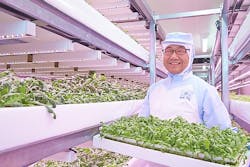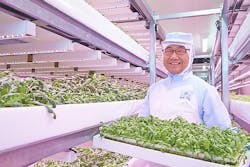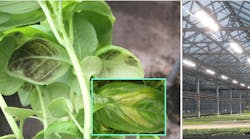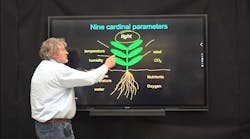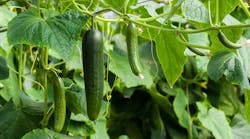Innovatus is using LEDs in an urban horticultural project growing lettuce in the Fuji area of Japan while prepared-food specialist Delicious Cook is growing its own specialty herbs in a Kanto region urban farm.
Philips Lighting has announced two additional horticultural lighting installations and the projects in Japan use the new tunable luminaire announced earlier this summer that the company refers to as the Philips GreenPower LED Production Module. Innovatus Inc has installed the solid-state lighting (SSL) products in a vertical farm located in the Fuji area that is growing lettuce. Delicious Cook Co Ltd, meanwhile is growing specialized herbs such as edible chrysanthemums and coriander for use in prepared foods that are sold prepackaged in various Kanto area outlets including convenience stores.
Interested in articles & announcements on horticultural lighting?
Vertical or urban farms are an increasingly critical component of the global food supply, especially in areas such as Japan with a dense population base and a shortage of land for traditional farming. For example, in a horticultural-lighting feature two years back we covered a lettuce farm in Tagajo, Japan that was producing 10,000 heads of lettuce per day in a vertical farm. Moreover, we at LEDs Magazine recently announced our inaugural Horticultural Lighting Conference slated for Oct. 12 in Chicago, and vertical farming will be a key topic at the one-day immersive conference.
The LED-lit growing operations deliver premium-quality produce that often doesn't even need to be washed while also slashing transportation costs and extending shelf life. "Increasingly, Japanese consumers are interested in a diverse variety of foods that have superior taste, are safe and nutritious as well as being offered at a reasonable price," said Udo van Slooten, business leader for Philips Lighting’s Horticulture Business. "Vertical farms are an ideal way to meet this growing demand for safe, fresh food especially in a country with highly-urbanized areas where space is at a premium."
Philips said it first supplied a vertical farm in Japan back in 2014 and that the region has emerged as one of the fastest-growing consumers of the company's horticultural lighting products. Innovatus began a trial of the LED technology in March 2015. Now the company is producing 12,000 heads of lettuce per day in a 1851-m2 floor area, while also providing valuable insight into light recipes that optimally produce lettuce.
"The trial using Philips GreenPower LED Production Module, has allowed us to grow five varieties of lettuces, mainly frilled lettuce, green leaf, and romaine that are of a consistent quality and locally-produced, using only a fraction of the water compared to lettuces grown in open fields," said Hitoshi Wada, director at Innovatus. "Also, the quality and control it has given us with our lettuce crops has enabled us to get lettuces to Tokyo supermarkets in just two hours after shipment. Furthermore, as the lettuces are grown and packaged in an extremely hygienic environment, there is no need to wash them before eating."
Delicious Cook, meanwhile, has a project ongoing that begun just ten months ago where the specialist food producer sought to cut its supply chain costs and improve the quality of ingredients in its prepackaged foods such as salads, noodle bowls, and sandwiches. The company created an urban farm in Narashino City in the Kanto region. The herb-growing operation includes an 80-mm2 cultivation area that is implemented in three layers and that occupies a total footprint of 80 mm2 including the space required for operations and workers. Philips partner CCS assisted with the installation.
"It is Delicious Cook’s strategy to transition from externally-produced food to food grown safely indoors," said Delicious Cook’s facilities manager Katsuhiro Takahashi. "No one imagined that Philips Lighting and CCS would be able to help us with horticultural LED light to deliver results so quickly. Now, Delicious Cook can rely upon its own high-quality produce, home-grown indoors all year round and avoid sourcing it from external suppliers."
While Philips only announced the GreenPower LED Production Module in June, the two Japan growers covered here have clearly had early access to the product. The luminaire includes a mix of four different types of LEDs — phosphor-converted white, and monochromatic red, blue, and far red. The programmable luminaire enables growers to experiment easily with different light recipes.
Philips, of course, offers a broad range of horticultural lighting products including linear products for top lighting and interlighting fixtures and strings, along with retrofit lamps. Moreover, Philips has pursued LED-based horticultural lighting products around the globe. Earlier this summer, we covered one such project at a French tomato farm.
